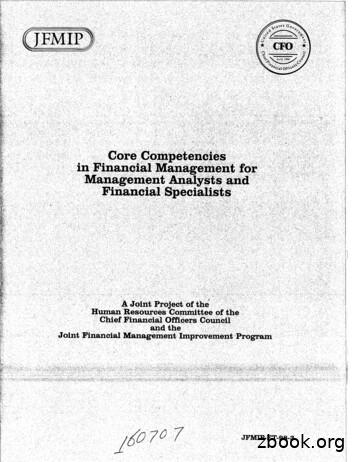Financial Management-Page 2
The objective of financial management systems is to generate complete, reliable, consistent, and timely information, to include standard Federal financial statements and VA-specific reports, and to be responsive to requests regarding VA financial and performance management. The financial management
Core Competencies in Financial Management fsr Management Analysts and Financial Specialists is the fifth in a series of core competencies publications developed by the Human Resources Committee of the U.S. Chief Financial Officers (CFO) Council and the Joint Financial Management Improvement
Procedures for Financial Management Procedure for evaluating the effectiveness of financial management: –Financial management policy: Review the financial management document approved –Procurement procedures: Compliance with legislation (BBBEE objectives) Adequacy of systems and procedures –Sys
B000037XQ Financial Management 3 Basic Officer Course TBS-LDR-1006b Given an evaluation, identify adverse financial management factors without omission. TBS-LDR-1006c Given a scenario, develop a financial budget plan to reach desired goals within available means. TBS-LDR-1006d Given an evaluation, identify financial management assistance resources
The main objectives of financial management are to reduce the expenses involved in procuring funds, to control risk and to achieve effective deployment of funds. Importance of Financial Management The role of financial management is as such that it has a direct impact on all the financial aspects/activities of a company. Certain aspects .
Business Partners: supporting financial management decision making and promoting a culture of financial responsibility across the system by level. Process, Governance and Controls to demonstrate effective financial management practices The CFO will define the financial management framework which is mandated across the health system.
countries, financial management capabilities have been eroded by the pursuit of financial populism ineffective and distorted budgetary mechanisms and breakdown of existing financial management institutions. The countries will have to harmonize methods of strategic management and control of aggregate financial variables with processes for changing
1.2.6 Financial Management: Finance is at the crux of any programme and a strong and proactive financial management system ensures effective and efficient utilisation of resources. Financial Management comprises Planning, Budgeting, Monitoring, Auditing, Disbursement, Accounting, fund flow and Procurement. For strong financial
Practical Financial Management for NGOs . Bank Book Basics 46 Petty Cash Book 47 Full Bookkeeping Systems 48 What is a Trial Balance? 49 What are Financial Statements? 51 The Income and Expenditure Report 51 The Balance Sheet 52 What is Depreciation? 54 55 5 FINANCIAL REPORTS 57 Introduction 57 Who Needs Financial Reports? 57 What are the Annual Accounts? 59 Interpreting Financial Statements .
increased Non-Financial risks and provide best practices from European financial institutions. 1. "Non-Financial Risk: Be a pioneer in key areas before you lead the list of fines" - Impact of Non-Financial Risk Management on financial institutions and main trends on the market -Erekle Tolordava and Hans Lohrmann 2.
The Moving Ahead Through Financial Management curriculum offers a range of information from basic money and financial management principles to advanced, long-term financial planning. It is divided into five separate modules. MODULE 1 Understanding Financial Abuse-Keeping Safe and Starting Over Financially Abusive Relationships
Financial knowledge and literacy are intended outcomes of financial counseling, although they are not the same concept (Huston, 2010). Financial literacy implies that an individual has the ability and confidence to use their financial knowledge to make financial de











